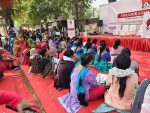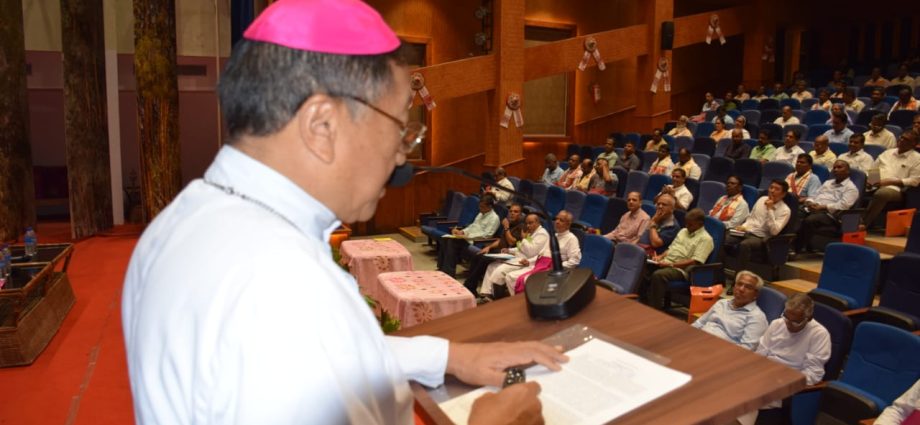By Kampan Chinnam
Guwahati, Oct 14, 2024: The 37th annual conference of Church law experts began October 14 with an appeal from an archbishop to correctly understand the canons to serve the Church better.
“Canonists need to have the correct understanding of the canons to assist dioceses and major superiors,” said Archbishop John Moolachira of Guwahati in his keynote address at the opening of the four-day conference at Guwahati, commercial capital of the northeastern Indian state of Assam.
More than 130 members of the Canon Law Society of India from across India are addressing “Penal Sanctions in the Church” at the October 14-18 program at the North East Diocesan Social Service Society.
Society president Father T Lourdusamy noted that the conference was being held for the first time in the region. He said the program is designed to equip canon lawyers with key insights and collaborative strategies, reinforcing the importance of understanding penal sanctions in maintaining the integrity of Church communities.
Archbishop Moolachira of Guwahati recalled that the early Church was a community of love and service. “When members of the Church err, punitive actions may be necessary for the good of the individual and the integrity of the community,” he said.
He acknowledged that punishment should be the last resort. “Pastoral exhortations, kind admonitions, fraternal corrections, earnest entreaties, and firm rebukes should precede penalties.”
Referring to Pope Francis’ modifications to Book VI of the Code of Canon Law, he said these changes aim at three key objectives within the Church: restoration of justice, amendment of the offender, and reparation for scandals.
He added that issues of obedience often lead clergy and laity to seek recourse in civil courts. “Canonists need to have the correct understanding of the canons to assist dioceses and major superiors,” he added.
Later in the day, Archbishop Linus Nelli of Imphal addressed the evolution of penal sanctions within the Church, noting a gradual reduction in penalties since the revision of Church Penal Law in 1917.
He stressed the need for the Church to adapt to contemporary realities.
“The new penal norms are aimed at reparative and salvific ends,” Archbishop Nelli said while explaining the pastoral dimensions of the penal system. He cited Prime Minister Narendra Modi’s vision to “eradicate the mentality and symbols of slavery” to create a “new confident India,” which prioritizes justice and fairness over punishment alone.

The conference is expected to address various aspects of penal sanctions in the coming days. They include “Penalties and Other Punishments in General in Book VI of CIC 1983” by Father Merlin Rengith Ambrose, “Particular Offences and Punishments” by Father Lourdusamy, and “Penal Procedures: Judicial and Extra-Judicial Procedures” by Father John Diraviam.
Another topic on the cards is the dismissal of clerics.
Bishop Albert Hemrom of Dibrugarh, chairman of the Canon Law Commission of the Northeast Bishops’ Council of India (NEIRBC), welcomed the participants.
In a video message, Cardinal Oswald Gracias, the society’s founder president, expressed regrets for missing the program as he was attending the Bishops Synod on Synodality in Rome. “It is essential for canonists to be updated on the changes and revisions within the Church’s penal law to apply them effectively with compassion,” said the cardinal’s message.
Cardinal Gracias invited members to consider what changes might be needed to make the Church more synodal and how participatory structures can be improved to meet contemporary challenges.
The day ended with the screening of the film “Face of the Faceless,” the award-winning movie on Blessed Rani Maria, who was martyred in the central Indian state of Madhya Pradesh
The society was founded on October 18, 1987, in Madras (now Chennai. “It has taken 36 years for the conference to reach the Northeast after voyaging through various regions of India,” the president noted.












Great indeed. 130 members of the canon law society meeting and discussing about the penal sanctions in the church. They need to bring about reformation in the church. There is no use sitting and discussing as to how to apply the sanctions on the poor priests, religious and lay people. What about the people in authority? Do they not come under the sanctions? Don’t we see that many of the priests simply punished by the authority for simple reasons and many a times unjustly punished??? Need to rework on these sanctions. Let the canon law society and the Vatican win the hearts of the priests, religious and lay people by applying the law of love of Jesus and not sanctions.
Penal Actions on Clergy/Religious
Conflicts between Ordinaries/hierarchy with clergy remain grey areas. There are priests without having access to Vatican /lack of canonical knowledge left in the lurch. Canonists could play its roles without fear & favours…
Another areas, in the absence of canon lawyers for lack of it or unwillingness, at least defendants clergy be allowed to have clergy/religious from civil law background